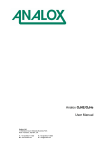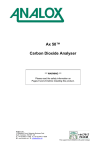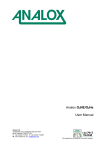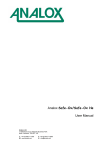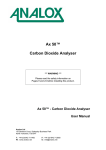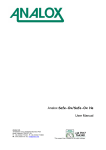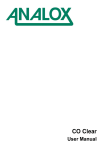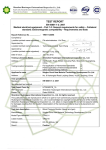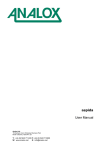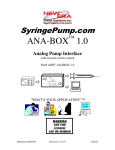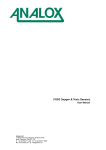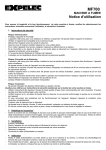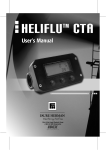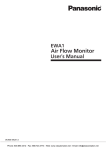Download this is a precision instrument, the oxygen sensor is susceptible to
Transcript
O2NE+ & Safe-Ox+ User Manual THIS IS A PRECISION INSTRUMENT, THE OXYGEN SENSOR IS SUSCEPTIBLE TO SHOCK, DO NOT DROP Analox Ltd. 15 Ellerbeck Court, Stokesley Business Park North Yorkshire, TS9 5PT, UK T: +44 (0)1642 711400 F: +44 (0)1642 713900 W: www.analox.net E: [email protected] This support line is closed on UK public holidays O2NE+ & Safe-Ox+ User Manual List of contents 1 2 3 4 5 6 7 8 9 Safety information .......................................................................................................... 3 Package contents checklist............................................................................................. 5 Overview ........................................................................................................................ 6 3.1 Partial pressure sensor .......................................................................................... 6 3.2 Setup ..................................................................................................................... 6 Installation of the product................................................................................................ 7 4.1 Wall mounting ........................................................................................................ 7 4.2 Wiring installation ................................................................................................... 8 4.3 AC supply models .................................................................................................. 8 4.4 DC supply models .................................................................................................. 8 4.5 Alarm repeaters ..................................................................................................... 9 4.6 Alarm relay output models .................................................................................... 11 4.7 Relay wiring ......................................................................................................... 11 4.8 Battery back-up .................................................................................................... 12 4.9 4 to 20mA output models ..................................................................................... 12 Operation ..................................................................................................................... 13 5.1 Normal operation ................................................................................................. 13 5.2 Alarm indications.................................................................................................. 13 Maintenance................................................................................................................. 14 6.1 Calibration ........................................................................................................... 14 6.2 Alarm checks ....................................................................................................... 15 6.3 Adjusting alarm set points .................................................................................... 16 6.4 Fault conditions.................................................................................................... 16 Specifications ............................................................................................................... 18 Disposal ....................................................................................................................... 19 Declaration of conformity .............................................................................................. 20 Document Ref: P0120-820-07 - August 2014 Page 1 O2NE+ & Safe-Ox+ User Manual Document Ref: P0120-820-07 - August 2014 Page 2 O2NE+ & Safe-Ox+ User Manual 1 Safety information Every gas monitor installation should be risk assessed. The correct location of monitor(s) must consider the potential sources of gas leaks and the location of expected human occupation in the area. Where large areas must be monitored, it is often advised that no single monitor should cover a volume in excess of 80m3. The installation of more monitors should be considered where an area is complex in shape, filled with obstacles, has a lack of ventilation or air circulation, or if there are dead zones where gas can collect The Ax O2NE+™/Safe-Ox+™ is designed to be compliant with the following standards: EN61010-1: 2001, IEC61010-1: 2001. It is designed to be safe at least under the following conditions. 1) Indoor use 2) Altitude up to 1800m 3) Temperature 0°C to +40°C 4) Maximum relative humidity 80% for temperatures up to 31°C decreasing linearly to 50% relative humidity at 40°C. 5) Mains voltage supply fluctuations not to exceed 10% of the nominal voltage 6) Impulse withstand (over-voltage) category II of IEC 60364-4-443 7) Pollution degree 2 8) Mains voltage:a. 230V AC b. 110V AC c. 24V DC (Not adjustable - Instrument will be factory set) (Not adjustable - Instrument will be factory set) (Not adjustable - Instrument will be factory set) 9) Mains power:a. Less than 5VA – 110V AC and 230V AC versions b. Less than 5W – 24V DC version. 10) Mains frequency - 50/60Hz 11) The remote alarm repeater has ingress protection to IP43: direct sprays of water up to 60° from the vertical in accordance with EN 60529:1991 + A1. All other units have ingress protection to IP65: low pressure water jets from all directions and totally protected from dust in accordance with EN 60529:1991 + A1. 12) Insulation: - Reinforced insulation, class II product according to IEC536. 13) Not for use in corrosive or explosive atmospheres 14) Not approved for use in vehicles, ships or aircraft Fuse ratings:230V AC, 500mA, 110V AC, 500mA, 9-24V DC, 200mA, F rating 250V (20mm x 5mm glass cartridge) F rating 250V (20mm x 5mm glass cartridge) AS rating 250V (20mm x 5mm glass cartridge) Document Ref: P0120-820-07 - August 2014 Page 3 O2NE+ & Safe-Ox+ User Manual Battery back-up:The battery back-up is non repairable. refurbishment/replacement. Please return faulty units to Analox for 4 to 20mA (or 0-1V) Output:External connected equipment must meet the requirements for reinforced insulation or must be a Safety Extra Low Voltage (SELV) circuit as defined in IEC60950-1. The above statement refers to the risk of externally connected equipment introducing hazardous voltages into the A50™ (O2NE+™, Safe-Ox+™ or CO Clear™). It is the responsibility of users of this product to ensure that their equipment/accessory is safe before connecting it. NOTE - If the equipment is used in a manner not specified by the manufacturer, the protection provided by the equipment may be impaired. NOTE - The O2NE+™ and Safe-Ox+™ range of instruments are precision instruments and can be susceptible to shock. Care should be taken when installing your O2NE+™ or SafeOx+™ to avoid instrument damage. Document Ref: P0120-820-07 - August 2014 Page 4 O2NE+ & Safe-Ox+ User Manual 2 Package contents checklist On receipt of the Ax O2NE+™/Safe-Ox+™ please check you have the following: 1) 2) 3) 4) 5) Ax O2NE+™/Safe-Ox+™ main unit and alarm repeater User manual Test certificate Rawl plugs and screws for wall mounting Drilling template Any optional items ordered such as: 1) 2) Additional alarm repeater’s each with 8 metres of interconnecting cable. Relay junction box Document Ref: P0120-820-07 - August 2014 Page 5 O2NE+ & Safe-Ox+ User Manual 3 Overview Two variants of this product are available. The Ax O2NE+™ O2 detector is designed to detect the presence of low oxygen in ambient air. The Ax Safe-Ox+™ O2 detector is designed to detect the presence of high and low oxygen in ambient air. Instrument Name Ax O2NE+™ Ax Safe-Ox+™ Application Sensor Type Fixed instrument configured as standard with two Partial pressure depletion alarms, representing warning (19.5%) and danger (18%) levels of oxygen Fixed instrument configured as standard with two Partial pressure pre-set alarm levels at 23.0% and 19.5% O2 3.1 Partial pressure sensor This type of sensor measures the partial pressure of oxygen in the atmosphere where the instrument is located. Therefore it is directly affected by fluctuations in atmospheric pressure. To counteract this, a pressure compensation sensor is used to compensate for changes in atmospheric pressure. The oxygen sensor used is not cross sensitive to helium so will measure correctly in the presence of a helium atmosphere. This means that the sensor can be safely used to detect oxygen displacement by helium gas leaks. Care should be taken however, if the Ax O2NE+™/Safe-Ox+™ is to be permanently exposed to a helium environment, as this can affect the performance of the pressure compensation sensor over time. Contact Analox for installation advice if you intend to use the unit in this way. 3.2 Setup Different versions of the instrument allow operation from 1) 210/250V AC supply 2) 110/120V AC supply 3) 9-24V DC supply The Ax O2NE+™/Safe-Ox+™ is intended to be used as a permanent installation. It provides a digital readout of oxygen, plus audible and visual alarms to potentially dangerous deficiencies (and abundancies in case of Ax Safe-Ox+™) of oxygen in the air surrounding the instrument. The instrument uses an electrochemical cell together with state of the art technology, built in an IP65 splash proof housing and is designed to provide long, trouble free service, with minimum maintenance. The Ax O2NE+™ has two pre-set alarm levels at 19.5% and 18% O2. The alarms are set with a small hysteresis which means the O2 concentration has to rise above the alarm set point before the alarm will cancel. The Ax Safe-Ox+™ has two pre-set alarm levels at 23.0% and 19.5% O2. The alarms are set with a small hysteresis which means the O2 concentration has to fall below the 23.0% alarm setpoint or rise above the 19.5% alarm setpoint before the alarm will cancel. Optional items fitted to or supplied with the unit may include the following: 1) Remote alarm repeater* 2) One or two medium duty relays 3) Test gas, flow indicators and control valves* 4) Flow adaptor* Items marked with an asterisk (*) do not need to be specified at the time of order and may be retro fitted Document Ref: P0120-820-07 - August 2014 Page 6 O2NE+ & Safe-Ox+ User Manual 4 Installation of the product NOTE – The O2NE+ and Safe-Ox+ range of instruments are precision instruments and can be susceptible to shock. Care should be taken when installing your O2NE+ or Safe-Ox+ so as to not damage the instrument. 4.1 Removal of warning label from display Prior to fitting the Ax O2NE+™/Safe-Ox+™ the warning label must be removed from the instrument display window. This is an easy peel label and should be removed easily without leaving behind any residue. 4.2 Wall mounting The Ax O2NE+™/Safe-Ox+™ should be mounted onto a wall at normal working head height using the mounting lugs and drilling template supplied. Use the paper template to drill the 4 required holes in the wall and use the rawl plugs and screws provided to mount the unit. It is not necessary to dismantle the Ax O2NE+™/Safe-Ox+™ main unit in any way prior to installation. You need to ensure the mains plug, fused at 3 amps, is in easy reach of a power socket. The alarm repeater housing also has wall mounting lugs. Document Ref: P0120-820-07 - August 2014 Page 7 O2NE+ & Safe-Ox+ User Manual 4.3 Wiring installation It is necessary to identify the model of Ax O2NE+™/Safe-Ox+™ prior to installation. The calibration certificate accompanying each instrument will clearly identify the information required. *** ENSURE THAT THE ELECTRICAL SUPPLY TO THE INSTRUMENT IS SWITCHED OFF WHILST INSTALLING ANY WIRING *** 4.4 AC supply models Mains powered Ax O2NE+™/Safe-Ox+™'s are pre-wired with a mains cable, fitted with a plug suited to the destination country. Where internal plug fuses are fitted, these are 3 amp. Ensure that the unit is connected to the correct supply voltage (i.e. 110 or 230V AC). Where no fuse is fitted in the plug, the instrument should be powered from a 3 amp fused outlet. The Ax O2NE+™/Safe-Ox+™ is fitted with an internal fuse, which is rated at 500mA. 4.5 DC supply models DC powered Ax O2NE+™/Safe-Ox+™ 's require a DC supply in the range 9-24V DC. A 2m cable is factory fitted to the instrument. The DC supply should be connected to this cable as follows: 1) 2) Blue wire negative (0Volts) Red wire positive (9 to 24Volts) Document Ref: P0120-820-07 - August 2014 Page 8 O2NE+ & Safe-Ox+ User Manual 4.6 Alarm repeaters The Alarm repeater has four status indicators and a Mode button, which mimic the button and indicators on the main Ax O2NE+™/Safe-Ox+™ enclosure. An 8 metre, 8 core cable is pre-wired to the Ax O2NE+™/Safe-Ox+™ on units to be fitted with an alarm repeater. This ensures that for a basic installation, there is no need to dismantle the Ax O2NE+™/Safe-Ox+™ main unit. A maximum of three repeaters may be fitted in a daisy chain configuration. 4.6.1 To connect a “Hard Wired” Remote Alarm Repeater 1) Disconnect the power supply from the Ax O2NE+™/Safe-Ox+™. 2) Open the Remote Alarm Repeater unit by removing the 4 screws in the front of the case and carefully pulling the case apart. The connecting wires from the Ax O2NE+™/Safe-Ox+™ pass through one of the cable glands on the Remote Alarm Repeater. 3) Terminate the wires in accordance with the table below REPEATER CABLE COLOURS Type 1 Repeater Term Type 2 (Cat 5) 8 7 6 5 4 3 2 1 ST1 Terminal No 3 2 4 5 6 7 8 1 1) Replace the lid of the Remote Alarm Repeater, insert and tighten the 4 screws, and mount it in the desired position using the 2 fixing lugs. 2) Restore power to the Ax O2NE+™/Safe-Ox+™. Press the switch on the Remote Alarm Repeater once, and ensure that the four indicators flash. Note that in the presence of a genuine alarm, this test feature is disabled. 4.6.2 To connect a “Quick Connect” Remote Alarm Repeater 1) Disconnect the power supply from the Ax O2NE+™/Safe-Ox+™. 2) Insert the connector on the end of the wire into either socket on the bottom of the Remote Alarm Repeater. Document Ref: P0120-820-07 - August 2014 Page 9 O2NE+ & Safe-Ox+ User Manual 3) Restore power to the Ax O2NE+™/Safe-Ox+™. Press the switch on the Remote Alarm Repeater once, and ensure that the four indicators flash. Note that in the presence of a genuine alarm, this test feature is disabled. 4.6.3 To connect a “Strobe” Remote Alarm Repeater 1) Disconnect the power supply from the Ax O2NE+™/Safe-Ox+™. 2) Open the Remote Alarm Repeater unit by removing the 4 screws in the front of the case and carefully pulling the case apart. The connecting wires from the Ax O2NE+™/Safe-Ox+™ pass through one of the cable glands on the Remote Alarm Repeater. 3) Terminate the wires in accordance with the table below REPEATER CABLE COLOURS Type 1 Repeater Term Type 2 (Cat 5) ST1 Terminal No 8 3 7 *See Note 4 6 4 5 5 4 6 3 7 2 8 1 1 4) Connect the free wire (Brown or Orange) to A50-231 main PCB at JP13 terminal 5. 3) Replace the lid of the Remote Alarm Repeater, insert and tighten the 4 screws, and mount it in the desired position using the 2 fixing lugs. 4) Restore power to the Ax O2NE+™/Safe-Ox+™. Press the switch on the Remote Alarm Repeater once, and ensure that the four indicators and the LED strobe flash. Note that in the presence of a genuine alarm, this test feature is disabled. Document Ref: P0120-820-07 - August 2014 Page 10 O2NE+ & Safe-Ox+ User Manual 4.7 Alarm relay output models You may have ordered your Ax O2NE+™/Safe-Ox+™ with a relay. The relay contacts are ‘Volt-Free’ single pole changeover, rated 240VAC/30VDC 2 amps. The relay is non-latching. This means the relay will only initiate when gas is present. As standard the relays are setup in a fail-safe configuration. This means that the relay is energised during normal operation. Please note that on power up the relay is only energised after the 10 second start-up period. See below for details of how the relay should be connected. 4.8 Relay wiring The cable gland is for cables of outside diameter between 5 and 7mm, if cable fitted is outside that range, a suitably specified cable gland must be used. Ensure that the gland is properly tightened. Test that the cable is adequately gripped by the cable gland. Ensure that the cable is suitable for purpose, the load is within the limits of the relay, 240VAC/30VDC, 2 amps, and the insulation of the external circuit meets the requirements for basic insulation 240VAC/30VDC, 2 amps. After completing wiring, ensure that the terminal box cover is securely replaced. RELAY TERMINAL BOX TERMINATIONS Document Ref: P0120-820-07 - August 2014 Page 11 O2NE+ & Safe-Ox+ User Manual 4.9 Battery back-up When this option is fitted the Ax O2NE+™/Safe-Ox+™ should remain powered for at least 30 hours to ensure the battery back-up is fully charged and will provide back-up power for a minimum of 4 hours in the event of mains power failure. 4.10 4 to 20mA output models You may have ordered your Ax O2NE+™/Safe-Ox+™ with a 4 to 20mA output. A 2m cable is factory fitted to the instrument. The 4 to 20mA output current is generated by the instrument. The customer system should be connected to this cable as follows and as per the following drawing: 1) Blue wire 4 to 20mA negative 2) Red wire 4 to 20mA positive Document Ref: P0120-820-07 - August 2014 Page 12 O2NE+ & Safe-Ox+ User Manual 5 Operation 5.1 Normal operation When the Ax O2NE+™/Safe-Ox+™ is turned on it will take approximately 10 seconds to startup. During this period, the 'Good/OK' and 'Fault' status indicators will be turned on. After the initial start-up period has expired, the 'Fault' status indicator will turn off. The 'Good/OK' status indicator will be illuminated and flash off briefly every few seconds, indicating normal operation. The status indicators on any alarm repeaters will mimic this operation. On display models the display will briefly read ‘8.8.8.8’ on power up before reverting to the O2 reading. Note: The instrument should be allowed to settle for a period of 2 hours before sensor readings stabilise. Momentarily pressing the 'Mode' button on either the Ax O2NE+™/Safe-Ox+™ or any alarm repeaters, in the absence of any alarm conditions, causes an alarm test to be performed. The indicator lamps will flash 4 times and the buzzer will sound. In all circumstances the alarm repeater will mimic the status indications and buzzer of the main unit. Units fitted with relays are configured such that relays may operate in conjunction with Alarm1 or Alarm2. By default they are set to be energised in the absence of alarms, and de-energised in the presence of alarms. They may be factory configured in the opposite sense if required. 5.2 Alarm indications 5.2.1 Ax Safe-Ox+™ If the Ax Safe-Ox+™ detects an O2 concentration which is greater than the high alarm level, then the 'Alarm 1' indicator will begin to flash and the buzzer will sound at its slow speed. If the measured concentration of O2 falls below the low alarm level, then the ‘Alarm 2' indicator will begin to flash and the buzzer will sound at its medium speed. On standard units the alarms are self-cancelling when the O2 concentration returns to a level within the alarm thresholds. Alternatively, latched alarm versions are available, on which the alarm conditions will be maintained until the ‘Mode’ switch has been pressed to accept the alarm, and the gas concentration has returned to a level within the alarm thresholds. 5.2.2 Ax O2NE+™ If the Ax O2NE+™ detects an O2 concentration which is less than the first alarm level, then the 'Alarm 1' indicator will begin to flash and the buzzer will sound at its slow speed. If the measured concentration of O2 continues to fall below the second alarm level, then the ‘Alarm 2' indicator will begin to flash and the buzzer will sound at its medium speed. The 'Alarm 1' indicator will continue to flash. On standard units the alarms are self-cancelling when the O2 level rises above the alarm limits. Alternatively, latched alarm versions are available, on which the alarm conditions will be maintained until the ‘Mode’ switch has been pressed to accept the alarm, and the gas level has risen above the alarm threshold. Document Ref: P0120-820-07 - August 2014 Page 13 O2NE+ & Safe-Ox+ User Manual 6 Maintenance 6.1 Calibration Note: Gases used on the Ax O2NE+™/Safe-Ox+™ must be manufactured to a ±2% tolerance. Note: For best performance the monitor should be powered and allowed to warm-up for approximately 2 hours before calibration is performed. This will allow the whole instrument to stabilise at its operating temperature. 6.1.1 Full calibration check A full calibration check should be performed on the Ax O2NE+™/Safe-Ox+™ after initial installation and every 18 months thereafter. In order to perform a calibration check, you will need the following equipment: 1) 2) 3) Test Gas with 20.9% oxygen in nitrogen, +/-2% tolerance 0.5 lpm regulator to suit calibration gas bottle Flow adaptor kit - Part No: P0120-651K Then follow the procedure: 1) Remove the flow adaptor and gasket from its protective backing. 2) Fit the flow adaptor including its gasket to the O2 sensor and connect, with tubing, to the cylinder and open the regulator to allow for the flow of gas over the sensor. Document Ref: P0120-820-07 - August 2014 Page 14 O2NE+ & Safe-Ox+ User Manual 3) Enter Technician Mode by pressing the mode switch 3 times. If entered successfully the green LED will flash off for 1.5 seconds and on for 0.5 of a second. 4) Select auto calibration by pressing the mode switch 4 times. The 2 Red Alarm LED’s will light up to show you are now in this mode. 5) Press the mode switch 2 times to start the Auto Calibration, the Red Alarm LED’s will turn off and the Green LED will continue to flash. 6) Wait one minute for the instrument to adjust. When the instrument has a new calibration value, the buzzer will sound one bleep and all the LED’s will be off. 7) Accept this new calibration value by pressing the mode switch 2 times. The green LED will flash to show the instrument has accepted the new oxygen value. To return to normal operation, press the mode switch once. The LED’s and buzzer will illuminate / sound 4 times before returning to normal operation. If, during the one minute wait period, the red or amber LED’s are illuminated consult the table below. ALARM1 LAMP (RED) ALARM2 LAMP (RED) FAULT LAMP (YELLOW) MEANING ON OFF OFF Calibration gas is above allowable range OFF ON OFF Calibration gas is below allowable range OFF OFF ON Internal fault ACTION Ensure the calibration gas is 20.9% oxygen in nitrogen with +/-2% tolerance Ensure the calibration gas is 20.9% oxygen in nitrogen with +/-2% tolerance Contact Analox. Note: If at any time you send the wrong instruction and would like to abort, press the mode switch once and wait 20 seconds, this should bring you back to technician mode. Press the mode switch once again, this should bring you back to normal operation, the LED’s and buzzer will illuminate/sound 4 times. Alternatively, disconnect the power supply to the Ax O2NE+™/Safe-Ox+™, wait a moment and re-connect power. 6.2 Alarm checks To verify that the indicators and the audible alarms are working, press the Mode switch on the Ax O2NE+™/Safe-Ox+™ or any of its repeaters. The indicators and the audible alarm will pulse four times. To verify that the alarm levels are correctly set, you will need the following equipment: 1) 2) 3) 4) A test gas cylinder containing 100% nitrogen For Safe-Ox+™ only a bump test gas with 23.5% oxygen in nitrogen, +/-2% tolerance 0.5 lpm regulator to suit calibration gas bottle Flow adaptor kit - Part No: P0120-651K Document Ref: P0120-820-07 - August 2014 Page 15 O2NE+ & Safe-Ox+ User Manual Then follow the procedure for the particular instrument type: 6.2.1 Ax O2NE+™ 1) Fit the flow adaptor including its gasket to the O2 sensor and connect, with tubing, to the 100% nitrogen cylinder and open the regulator to allow for the flow of gas over the sensor. 2) After a few moments, the 'Alarm 1' alarm should operate, followed a little later by the 'Alarm 2' alarm. 3) Remove the test gas. It will take a little while for the N2 mixture to diffuse out of the instrument sensor, allowing the unit to recover to its normal non-alarm condition. 6.2.2 Ax Safe-Ox+™ 1) Fit the flow adaptor including its gasket to the O2 sensor and connect, with tubing, to the 100% nitrogen cylinder and open the regulator to allow for the flow of gas over the sensor. 2) After a few moments, the 'Alarm 2' alarm should operate. 3) Remove the test gas. It will take a little while for the N2 mixture to diffuse out of the Instrument Sensor, allowing the unit to recover to its normal non-alarm condition. 4) Fit the flow adaptor to the O2 sensor and connect, with tubing, to the 23.5% oxygen bump test cylinder and open the regulator to allow for the flow of gas over the sensor. 5) After a few moments, the 'Alarm 1' alarm should operate. 6) Remove the test gas. It will take a little while for the mixture to diffuse out of the instrument sensor, allowing the unit to recover to its normal non-alarm condition. 6.3 Adjusting alarm set points The procedure is very similar for setting either Alarm 1 or Alarm 2. 1) Whilst the O2NE+™/Safe-Ox+™ is switched on, enter technician mode by pressing the mode switch 3 times. If entered successfully the green LED will flash off for 1.5 seconds and on for 0.5 of a second. 2) From technician mode, press the ‘Mode’ switch 2 times to set Alarm 1 or 3 times to set Alarm 2. The buzzer will bleep on each press. If this is done successfully, the instrument will show the ‘Fault’ indicator and the appropriate ‘Alarm’ indicator. If this is done inadvertently, or if another mode is selected, press the ‘Mode’ switch once to return to technician mode and then repeat this selection. 3) The display will indicate the present value of the alarm. 4) Press the ‘Mode’ switch twice to proceed to define a new setting, or once to abort and return to technician mode. 5) Press and hold the ‘Mode’ switch. The displayed value will count down at approximately one count per second. Release the switch when the displayed value is equal to the desired alarm value. 6) Upon release of the ‘Mode’ switch, the display will continue to show the new value. Accept the new setting by pressing the ‘Mode’ switch twice, or alternatively ignore the new setting by pressing the switch once. This will return to the technician mode. 7) To exit from technician mode, press the Mode switch once. The O2NE+™/SafeOx+™ then restarts by performing the normal power on sequence (4 flashes). 6.4 Fault conditions During normal operation, the instrument carries out a continuous self-test procedure. If operation is satisfactory, the ‘Good/OK’ status indicator will be on, blinking off momentarily every few seconds. 1) If there are no indicator lamps lit on the O2NE+™/Safe-Ox+™, check that power is connected and that the fuses are OK. 2) If the 'Good/OK' indicator is off, and the alarm indications are believed to be incorrect, carry out a full calibration. If this fails to correct the problem contact your qualified service engineer. Document Ref: P0120-820-07 - August 2014 Page 16 O2NE+ & Safe-Ox+ User Manual A summary of the indicator lamps and buzzer operations is shown in the following tables. 6.4.1 Ax O2NE+™ OK LAMP (GREEN) OFF ON/ BLIP OFF OFF OFF ALARM1 LAMP (RED) OFF OFF FLASHING AND SLOW BUZZER FLASHING OFF OFF FLASHING AND MED. BUZZER OFF OFF FLASHING OFF OFF FLASHING ♦ FLASHING ♦ OFF OFF OFF † ALARM2 LAMP (RED) OFF OFF OFF FAULT LAMP (YELLOW) OFF OFF OFF OFF FLASHING AND SLOW BUZZER FLASHING AND FAST BUZZER FLASHING AND FAST BUZZER FLASHING AND VERY FAST BUZZER MEANING Power Off Normal Operation O2 Level is < 19.5% † O2 Level is < 18% † Calibration Error at Switch On ‡ O2 Cell Fault Output too High O2 Cell Fault Output too Low Internal system fault contact Analox Note that alarm levels may be set at different values, depending on customer requirement ‡ A calibration error or a cell fault requires the attention of a service engineer. A recalibration procedure may overcome the problem. ♦ Only 6.4.2 when Alarm 1 and Alarm 2 are enabled. Ax Safe-Ox+™ OK LAMP (GREEN) OFF ON/ BLIP OFF OFF OFF ALARM1 LAMP (RED) OFF OFF FLASHING AND SLOW BUZZER FLASHING OFF OFF FLASHING AND MED. BUZZER OFF OFF FLASHING OFF OFF FLASHING ♦ FLASHING ♦ OFF OFF OFF † ALARM2 LAMP (RED) OFF OFF OFF FAULT LAMP (YELLOW) OFF OFF OFF OFF FLASHING AND SLOW BUZZER FLASHING AND FAST BUZZER FLASHING AND FAST BUZZER FLASHING AND VERY FAST BUZZER MEANING Power Off Normal Operation O2 Level is > 23.0% † O2 Level is < 19.5% † Calibration Error at Switch On ‡ O2 Cell Fault Output too High O2 Cell Fault Output too Low Internal system fault contact Analox Note that alarm levels may be set at different values, depending on customer requirement ‡ A calibration error or a cell fault requires the attention of a service engineer. A recalibration procedure may overcome the problem. ♦ Only when Alarm 1 and Alarm 2 are enabled. Document Ref: P0120-820-07 - August 2014 Page 17 O2NE+ & Safe-Ox+ User Manual 7 Specifications O2 range Sensor accuracy Response time (T90) Operating temperature Temperature effect Atmospheric pressure range Warm up time Weight (without cables) Dimensions IP rating Sensor type Display Alarms Relays Output Power supply options 0.1 to 25% Better than ± 0.75% O2 over 5.0 to 25.0% O2 Better than ± 1.00% O2 over 0.1 to 5.0% O2 60 seconds 0 to +40°C (+32 to +104°F) 0.2% of reading/°C or 0.1115% of reading/°F 811 to 1050mbar absolute 10 seconds to normal operation Prior to calibration allow 2 hours to achieve full accuracy. O2NE+™/ 600g Alarm Repeater O2NE+™/Safe-Ox+™ Alarm Repeater O2NE+™/Safe-Ox+™ 150g 175x105x75 mm 155x72x45 mm IP65 Alarm Repeater Hard wired – IP65 Quick connect – IP43 Electro-Chemical Cell 4 digit Liquid Crystal Display 2 x Alarm Visual Indicators 1 x System Fault Indicator 1 x Status Indicator Common Audible Alarm One or Two Optional Alarm Relays with changeover contacts assigned to Alarm 1, Alarm 2 or System Fault. Contact Rating 240V AC or 30V DC at up to 2A. Contacts are non-latching Fail-Safe. 2 wire, 4 to 20mA (Max load 150 Ω) a) 210 to 250VAC supply b) 110 to 120VAC supply c) 9-24VDC supply Document Ref: P0120-820-07 - August 2014 Page 18 O2NE+ & Safe-Ox+ User Manual 8 Disposal According to WEEE regulation this electronic product can not be placed in household waste bins. Please check local regulations for information on the disposal of electronic products in your area. Document Ref: P0120-820-07 - August 2014 Page 19 O2NE+ & Safe-Ox+ User Manual 9 Declaration of conformity Manufacturers name: Manufacturers address: Analox Ltd 15 Ellerbeck Court Stokesley Business Park Stokesley North Yorkshire TS9 5PT It is declared that the following product: Product name: Product code: Conforms to all applicable requirements of: Ax O2 NE / Ax Safe-Ox AA1 / P0120 EN50270:1999 EN61000-6-3:2001+A11:2004 BS EN 61010-1:2001 IEC 61010-1(2ed) AS61610.1-2003 (Australia & New Zealand) The above product complies with the requirements of the EMC Directive 89/336/EEC, as amended. The above product complies with the requirements of the Low Voltage Directive 73/23/EEC, as amended. The above product is approved for use in Europe, CB Test Certificate NO44944 The above product complies with the Australian and New Zealand EMC requirements for CTick marking Signed on behalf of: Date: Analox Ltd 01/06/2012 Signed: Name: Position: Document Ref: P0120-820-07 - August 2014 Page 20 Mark Lewis Managing Director























